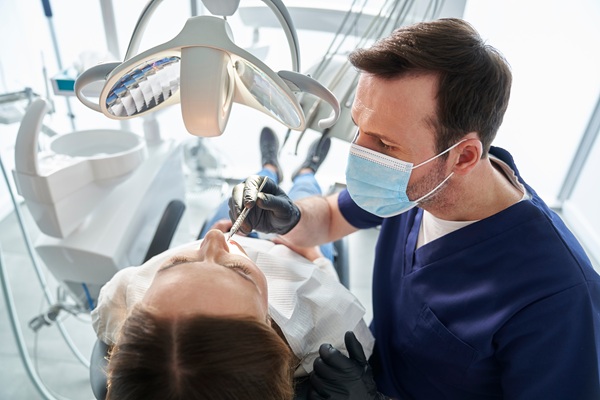When Your Dentist Checks Your Gum Health During Your Dental Check-up

When you go to the dentist for your annual dental check-up, your dentist will conduct a thorough examination of your teeth and gums to ensure that they are healthy and free from decay or disease. During this visit, your dentist may use an instrument called a periodontal probe to measure how deep the pockets around your teeth are when you’re at rest. This information will help your dentist determine if you have gum disease, which could result in tooth loss if left untreated. It's important that you don't skip these visits as it will likely be the first step in identifying any issues as early as possible. Follow these tips when visiting the dentist during your next dental check-up.
What happens during a check-up?
When you visit your dentist for a check-up, they will take an x-ray of your teeth to look for signs of decay. After examining your teeth in person, they may also do additional tests. This will allow them to see whether germs grow between your teeth and below your gum line. If so, you may need a deep cleaning called scaling and root planing—or even a tooth extraction. But first, you might be able to avoid all that with proper daily care at home: regular brushing and flossing as well as healthy eating habits. If nothing else, having professional dental check-ups can catch problems early on before they cause more significant issues later down the road.
Usually, check-ups happen at least once a year, but your dentist may suggest more frequent visits if you’re experiencing certain issues. For example, if you have gum disease or other dental problems that aren’t being taken care of with regular brushing and flossing—or if your mouth is prone to infections—you might be advised to come in every three months instead. There are plenty of things we can do to prevent tooth decay and gum disease from developing in the first place.
Tips to keep your teeth healthy
Following a good oral hygiene routine is absolutely critical when it comes to protecting your teeth While there is some debate about whether you can catch cavities or not, we know for sure that mouth health goes hand in hand with dental health. As such, make sure to maintain good oral hygiene by flossing your teeth every day and using mouthwash. You should also brush your teeth at least twice a day using a soft-bristled toothbrush and avoid hard foods like candy and chewing gum; these can damage your teeth and gums. A dental check-up will ensure that you stay on top of your oral health and keep you from damaging your teeth or developing cavities before they get worse. Typically, you should plan on visiting your dentist twice per year or as recommended based on your specific needs. Of course, you should also reach out to your dentist if you experience any pain or notice any changes in your teeth or gums. Any of these could mean that there is a bigger issue going on that needs to be addressed as soon as possible.
How you can have healthy gums at home
If you want to stay on top of your gum health at home, here are some tips: Brushing and flossing daily will help eliminate food particles, plaque, and bacteria from irritating your gums. This can keep minor irritations from becoming more significant problems. Try a softer toothbrush with soft bristles that more gently massage your gums if you have sensitive teeth.
In addition to brushing and flossing twice a day, use over-the-counter rinses designed for sensitive gums or ask your dentist for recommendations to prevent sensitivity during dental check-ups. Using mouthwash without alcohol may be soothing to sore gums as well. While there is no cure for gum disease at home, there are steps you can take today to protect yourself from future damage.
Talk to your dentist today
Good oral health begins at home, but it's also critical that you adhere to your dentist's advice and recommendations. reach out to your dentist to learn more about good oral hygiene tips, and what you should do to protect your smile in-between visits. If you notice any changes in your teeth, it's important that you let your dentist know right away as it could be a sign of a more serious issue. Reach out to your dentist today to learn more about proper care, and to schedule your next check-up.
Request an appointment here: https://www.oaktreefamilydental.com or call Oak Tree Dental at (703) 763-5239 for an appointment in our McLean office.
Check out what others are saying about our dental services on Yelp: Gum Disease in McLean, VA.
Recent Posts
Gum disease is a common yet serious oral health issue that can cause discomfort, damage, and even tooth loss if left untreated. With the right gum disease treatment, patients can not only stop the infection in its tracks but also restore the patient's overall oral health. Knowing the true impact of gum disease and how…
Keeping your gums healthy needs to be a key priority in your oral care routine. Effective care at home and at your dentist's office can prevent gum disease, a chronic condition that puts your overall oral health in jeopardy. Chronic or severe gum disease can lead to infections, loose teeth, and eventually permanent tooth loss.…
Gum disease starts with the growth of bacteria in the mouth. When brushing or flossing does not remove this bacteria, harmful plaque accumulates and hardens into tartar. The collection of tartar along the gum line results in gingivitis, which can worsen into periodontal disease. Symptoms of this disease can be mild in the early stages,…
Gum disease is one of the most common issues that dentists treat. It is most likely to affect people over 30, and the bacteria that live inside the mouth cause it. Also known as periodontal disease, gum disease develops when bacteria infect gum tissues.Poor oral hygiene is one of the leading risk factors for gum…


